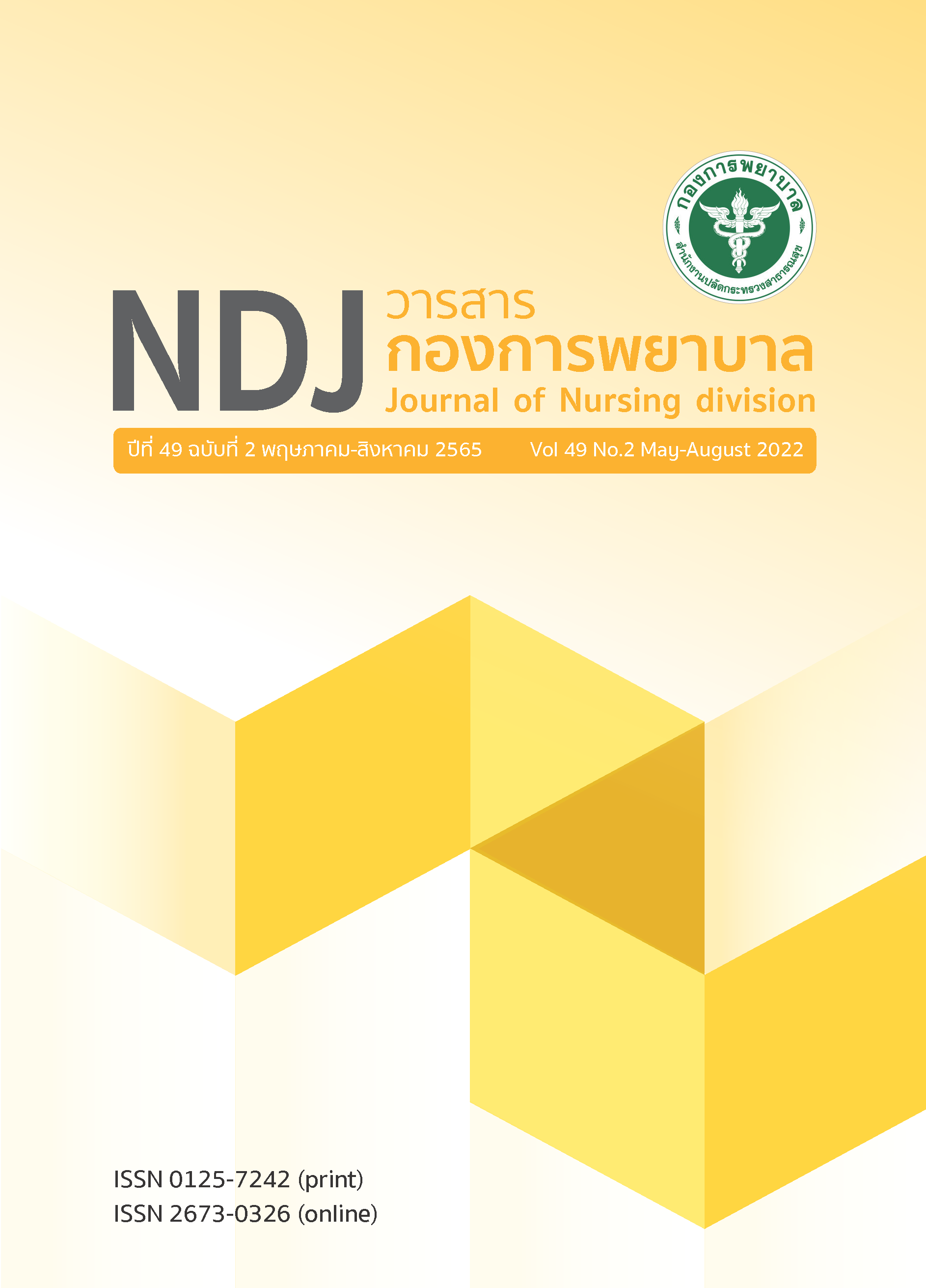ประสิทธิผลของการใช้แนวปฏิบัติการพยาบาลในการดูแลผู้ป่วยที่ใส่สายสวน หลอดเลือดดำส่วนกลางของพยาบาลวิชาชีพ
Main Article Content
บทคัดย่อ
การวิจัยกึ่งทดลองแบบกลุ่มเดียววัดซ้ำ มีวัตถุประสงค์เพื่อศึกษาประสิทธิผลของการใช้แนวปฏิบัติการพยาบาลในการดูแลผู้ป่วยที่ใส่สายสวนหลอดเลือดดำส่วนกลางของพยาบาลวิชาชีพ กลุ่มตัวอย่างเป็นพยาบาลวิชาชีพในศูนย์การแพทย์สมเด็จพระเทพฯ สยามบรมราชกุมารีปฏิบัติงานดูแลผู้ป่วยที่ใส่สายสวนหลอดเลือดดำส่วนกลาง จำนวน 30 คน เก็บข้อมูลด้วยแบบสอบถามส่วนบุคคล แบบประเมินความเป็นไปได้ในการใช้แนวทางปฏิบัติการพยาบาล แบบประเมินความรู้ แบบประเมินความพึงพอใจ และ Flow Sheet Central line ในการใช้แนวปฏิบัติการพยาบาลผู้ป่วยที่ใส่สายสวนหลอดเลือดดำส่วนกลาง วิเคราะห์ข้อมูลด้วยความถี่ ร้อยละ ค่าเฉลี่ย ส่วนเบี่ยงเบนมาตรฐาน และ ANOVA
ผลการวิจัย พบว่า คะแนนเฉลี่ยความรู้ในการดูแลผู้ป่วยที่ใส่สายสวนหลอดเลือดดำส่วนกลางของพยาบาลวิชาชีพก่อนการใช้แนวปฏิบัติ ภายหลังใช้แนวทางปฏิบัติ และนำกลับไปปฏิบัติงานเป็นระยะเวลา 4 สัปดาห์ มีความรู้แตกต่างกันอย่างมีนัยสำคัญที่ระดับ .001 พยาบาลมีความพึงพอใจต่อแนวปฏิบัติการพยาบาลอยู่ในระดับมากถึงมากที่สุด หลังใช้แนวปฏิบัติเป็นระยะเวลา 1 เดือน อุบัติการณ์การเกิดการติดเชื้อ การเลื่อนหลุด และการอุดตันลดลง และพยาบาลวิชาชีพ เห็นว่ามีความเป็นได้ในการนำไปใช้ในการดูแลผู้ป่วยที่ใส่สายสวนหลอดเลือดดำส่วนกลาง ดังนั้น ควรส่งเสริมการใช้แนวปฏิบัติการพยาบาลในการดูแลผู้ป่วยที่ใส่สายสวนหลอดเลือดดำส่วนกลางอย่างต่อเนื่องเพื่อเพิ่มคุณภาพและประสิทธิภาพการดูแลผู้ป่วย
Article Details

อนุญาตภายใต้เงื่อนไข Creative Commons Attribution-NonCommercial-NoDerivatives 4.0 International License.
เอกสารอ้างอิง
Infection control of HRH Princess Maha Chakri Sirindhorn Medical Center, Statistics of CABSI from patient in ICU between 2012-2016. Nakhonayok: HRH Princess Maha Chakri Sirindhorn Medical Center; 2016. Thai.
Buachuen S, Pittayapan P. Effectiveness of peripherally inserted central catheter training program on nurses’ knowledge, attitude, confidence and care. J Nurs Sci 2018; 36(3):20-33. (In Thai).
Sirireung S. Central venous catheter care in children. Rama Nurs J 2008; 14(1): 279-288. (In Thai).
Sirilerttrakul S. Management of thrombotic occlusion in central venous catheters [Internet]. 2016 [cited 2018 Dec 5]. Available from: http://www.C:/Users/com/Downloads/thrombotic-occlusion%20(1).pdf (In Thai).
Haire WD, Herbst SL. Invited Review: Use of Alteplase (tPA) for the Management of Thrombotic Catheter Dysfunction: Guidelines from a Consensus Conference of the National Association of Vascular Access Networks (NAVAN). Nutrition in clinical Practice 2000; 15(6):265-75.
Infusion Nurses Society. Infusion nursing standards of practice. J Infus Nurs. 2016; 39 Suppl 1:S11-159.
Maki DG. Infectous caused by intravascular devices used for infusion therapy: Pathogenesis, prevention, and management, In: Bisno AL, Waldvogel FA, editors. Infections associated with indwelling medical devices. 2nd ed. Washington, DC: American Society for Microbiology; 1994.155-212.
Odendaal J, Kong VY, Sartorius B, Liu TY, Liu YY, Clarke DL. Mechanical complications of central venous catheterization in trauma patients. Ann R Coll Surg Engl 2017; 99(5):390-93.
O’Grady NP, Alexander M, Dellinger EP, Gerberding JL, Heard SO, Maki DG, et al. (2002). Guidelines for the prevention of intravascular catheter-related infections. Infection Control and Hospital Epidemiology 2002; 23(12):759-69.
O’Grady NP, Alexander M, Burns LA, Dellinger EP, Garland J, Heard SO, et al. Guidelines for the Prevention of Intravascular Catheter - Related Infections. Clinical Infectious Diseases 2011;52(9):e162–e193.
Brown SV, Baier R. (2010). Central Line-Associated Bloodstream Infections (CLABSI) in Rhode
Island. Med Health R I. 93(9):289-90.
Asanathong N W, Rongrungreung Y, Assanasen S, Pumsuwan V, Wiruchkul N, Lapphra K , et al.
(2014). Epidemiology and trends of important pediatric healthcare-associated
infection at siriraj. SoutheaSt aSian J trop Med public health. 48(3):241-54.
Stevens V, Geiger K, Concannon C, Nelson RE, Brown J, Dumyati G. (2014). Inpatient costs,
mortality and 30-day re-admission in patients with central-line-associated
bloodstream infections. Clinical Microbiology and Infection. 20(5): 318-324.


